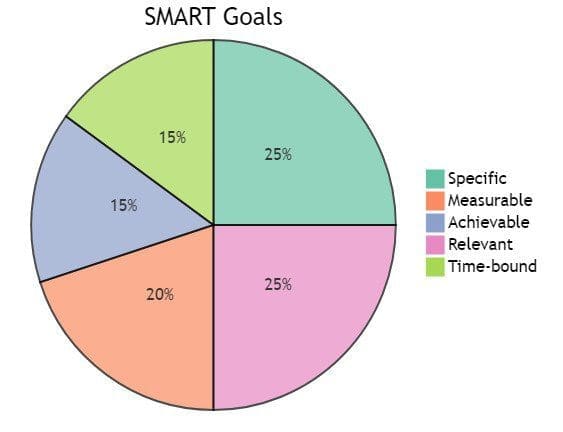Effective Digital Marketing Strategies for Small Businesses
Local businesses play a vital role in the economy, but they often face challenges in standing out in a crowded market. With the increasing use of digital technologies, developing a small business digital marketing plan can help small and local business owners increase the awareness of their brand, drive traffic to their website, and generate more leads and sales. However, creating an effective online marketing system can be challenging, especially for small businesses with limited resources. In this article, we will discuss various strategies and tactics that small businesses can use to develop a successful online plan, with real-world examples and case studies.
Before You Begin: Define Your Goals and Audience

An illustration of the distribution of SMART goals across the five criteria.
Before you begin any marketing effort, it is essential to identify your marketing goals and customer personas. Your marketing objectives should align with your business objectives. They should be specific, measurable, achievable, relevant, and time-bound (SMART).
Example: A Small Online Clothing Store
For example, let’s consider the case of a small online clothing store that wants to increase sales. One of their objectives could be to increase website traffic by 50% in the next six months, which will ultimately help them increase their sales. This goal is specific, measurable, achievable, relevant, and time-bound.
Once you have set your marketing desires, it is essential to identify your target audience. Who are your ideal customers? What are their interests, needs, and pain points?
Example: A Small Local Coffee Shop
Let’s take the example of a small local coffee shop. Their target customer will likely be local residents looking for a cozy place to relax and enjoy a cup of coffee. The coffee shop can create marketing messages that appeal to this audience, such as promoting their locally sourced coffee beans or highlighting the comfortable seating and free Wi-Fi.
Nurture Leads and Customers with Email Marketing

Effectively using email will help grow your business.
Email marketing is an effective way to nurture leads and customers, promote what you do, and drive traffic to your website. To get started with this method of marketing, you will need to build an email list by offering incentives, such as exclusive content or discounts, to encourage visitors to sign up for your newsletter or updates.
Creating compelling and targeted email content that is personalized to your audience’s interests and needs is crucial. It is also important to choose an email marketing platform that fits your needs and budget. Some popular email systems include Mailchimp, Constant Contact, and Campaign Monitor.
Example: A Small Yoga Studio
Email marketing is an effective way for a small yoga studio to reach out to their existing customer base and promote their services. For example, the yoga studio can send out a regular newsletter with updates on new classes, upcoming workshops, and special events. They can also use email segmentation to tailor their messages to specific groups of subscribers, such as those who prefer a certain type of yoga or those who have attended a particular workshop in the past. Additionally, the studio can offer exclusive discounts and promotions to their email subscribers, further incentivizing them to continue practicing yoga with the studio. By leveraging email, the small yoga studio can increase engagement with its existing customers and attract new ones to its classes and workshops.
Best Email Platforms
| Platform | Price (Starting at) | Features |
|---|---|---|
| Mailchimp | $9.99/month | Email campaigns, audience management, marketing CRM |
| Constant Contact | $20/month | Email campaigns, event management, social media posting |
| Campaign Monitor | $9/month | Email campaigns, automation, reporting |
Create Valuable Content with Small Business Content Marketing

Digital advertising is one way many small businesses grow.
Content marketing involves creating and sharing valuable, relevant, and consistent content to attract and retain a clearly defined audience. This type of marketing can take many forms, including blog posts, videos, social media posts, infographics, and more. To begin, you will need to identify the topics relevant to your target audience and align them with your goals.
Developing a content strategy that includes creating and publishing high-quality content on a regular basis is important. Promote your content on social media and other relevant channels to reach a wider audience. Some popular content tools include Canva, Grammarly, and Buzzsumo.
Example: How a Local Bakery Boosted Sales with Content Marketing
The local bakery, Sweet Delights, wanted to increase its customer base and promote its brand in the community. They decided to implement a content marketing strategy to achieve their goals.
First, they identified their perfect audience: people who enjoy baked goods and are interested in locally sourced ingredients. They created a blog on their website where they shared recipes, baking tips, and stories about the history of their bakery.
Sweet Delights created social media profiles on Facebook, Instagram, and Twitter to promote their blog content. They used these platforms to share their blog posts and photos of their delicious baked goods.
As a result, Sweet Delights saw an increase in website traffic, social media followers, and in-store sales. Customers were engaged by the bakery’s authentic storytelling and their commitment to using fresh, locally sourced ingredients.
Overall, Sweet Delights’ content strategy allowed them to stand out in a crowded market and connect with their target customer in a meaningful way.
Top Content Marketing Tools
| Tool | Price (Starting at) | Features |
|---|---|---|
| Canva | Free | Graphic design, templates, photos, videos, presentations |
| Grammarly | $11.66/month | Writing assistant, grammar check, plagiarism check, tone check |
| Buzzsumo | $99/month | Content research, competitor analysis, influencer identification |
Rank Higher in Search Engine Results Pages with SEO
Search engine optimization (SEO) is the process of optimizing your website and content to rank higher in search engine results pages (SERPs). SEO is an important online small business marketing strategy because it can help you reach people who are searching for things related to your business.
To optimize your website and content for search engines, you must conduct keyword research to identify the specific words and phrases your ideal audience is searching for. Use tools like Google Keyword Planner, Ahrefs, and SEMrush to find relevant keywords and phrases.
Optimize your website’s structure and content to make it easy for search engines to crawl and index. Use title tags, meta descriptions, and header tags to signal the relevance and importance of your content to search engines.
Create high-quality, relevant content that includes your target keywords and phrases. Building high-quality backlinks to your website from other reputable sites is also important.
Case Study: A Small E-commerce Store
The small e-commerce store “Luxe Boutique” implemented an SEO strategy to boost its web presence and drive more traffic to its website. They conducted thorough keyword research to identify the most relevant search terms for their products and optimized their website’s structure and content accordingly.
As a result, Luxe Boutique saw a significant increase in organic search traffic, with their website appearing on the first page of Google search results for their target phrases. This led to a boost in sales, as more people were able to find and buy their products online.
By implementing a well-planned SEO strategy, Luxe Boutique was able to compete with larger e-commerce stores and increase its visibility in a crowded online marketplace.
Promote Your Business and Engage with Customers on Social Media

As a small business owner, you should engage with your online audience.
Social media marketing involves using social platforms like Facebook, Twitter, Instagram, and LinkedIn to promote your business and engage with potential buyers. Marketing your small business with social media is a powerful way to build company awareness, promote what you sell, and connect with your customer avatar.
To get started marketing your business with social media, you will need to choose the social media outlets that are most relevant to your target audience and align with your online goals. Create a company profile that includes your logo, business description, and contact information.
Develop a social media content strategy that includes creating and publishing engaging content on a regular basis. Promote your social media profiles to your email list, website visitors, and other marketing channels to build your following.
Engage with your followers by responding to comments, messages, and reviews promptly and professionally. Use social media listening tools like Hootsuite, Sprout Social, and Buffer to monitor and respond to mentions of your brand or products on social media.
Case Study: A Small Restaurant
A small restaurant in downtown San Francisco wanted to attract more customers by promoting its menu items and engaging with its customers. They decided to use social media marketing to achieve their goals. The restaurant used Instagram to post high-quality photos of their dishes, showcasing their ingredients and presentation. They also used Twitter to share updates on their daily specials and upcoming events.
By using social media, the restaurant was able to engage with its customers and receive feedback on its menu items. They responded to customer reviews and addressed any concerns, which helped improve their online reputation. As a result, they were able to attract new customers who discovered their restaurant through social media.
The restaurant also offered discounts to customers who checked in on platforms like Facebook and Yelp, encouraging more patrons to visit and leave positive reviews. Their social media strategy helped them increase their customer base and grow their business.
Popular Social Media Platforms
| Platform | Monthly Active Users | Demographics |
|---|---|---|
| 2.8 billion | Wide range of demographics | |
| 1.2 billion | A younger audience, visual content | |
| 330 million | News and current events | |
| 740 million | Professionals and B2B businesses |
Partner with Influencers to Reach a Wider Audience

Working with influencers is one of effective strategies for your business.
Influencer marketing involves partnering with individuals with a large social media following to promote your products or services. Working with influencers can help you reach a wider audience, build brand awareness, and drive sales.
To start working with this kind of marketing, you must identify influencers who align with your brand values and ideal audience. Reach out to influencers and negotiate a partnership agreement that includes compensation and expectations.
Provide influencers with your products or services to promote to their audience. Monitor and measure the results of your influencer marketing campaigns to determine their effectiveness.
Example: A Small Fashion Brand
Fashionista, a small fashion brand, did some local marketing using influencers to drive sales and reach a wider audience. They partnered with several popular fashion bloggers and Instagram influencers who shared their clothing line with their followers. By providing the influencers with free clothing and commission on sales, Fashionista created a mutually beneficial partnership that helped them reach their audience and boost sales. This marketing campaign not only helped Fashionista increase their brand awareness but also provided them with valuable user-generated content for their social media.
Top Influencer Marketing Platforms
| Platform | Price | Features |
|---|---|---|
| AspireIQ | Custom | Influencer discovery, campaign management |
| Upfluence | Custom | Influencer discovery, campaign management |
| HypeAuditor | $299/month | Influencer analysis, fraud detection |
Optimize Your Internet Presence for Local Search

Claim your business on GBP (formerly GMB).
Local search marketing involves optimizing your Internet presence to appear in local search results when likely customers search for products or services in your area. Marketing for local search is an effective way to reach customers who are searching for businesses like yours in their local area.
To optimize your business for local search, you will need to claim and verify your business on Google Business Profile (formerly Google My Business). Optimize your company profile with accurate and complete information, including your address, phone number, and hours of operation.
Encourage customers to leave reviews on your Google Business Profile. Building local citations by listing your business on relevant directories and websites is also important.
Example: A Small Law Firm
A small law firm that specializes in personal injury cases can use local search strategies to entice clients in their area. They can start by claiming and optimizing their Google Business Profile, which includes adding their address, phone number, and website URL. By providing accurate and up-to-date information, they can increase the chances of their business appearing in local search results when potential clients search for phrases related to their services.
In addition to optimizing their Google profile, the law firm can also encourage clients to leave reviews on their profile. Positive reviews can improve their local search ranking and help build trust and credibility with potential clients. They can also respond to positive and negative reviews to show that they value client feedback and are committed to providing excellent service.
The law firm can build local citations on legal directories and websites to further increase its online visibility. These citations include their business name, address, and phone number and can help improve their visibility in local search results. They can also create content that addresses common questions and concerns that potential clients may have, such as what to do after a car accident or how to file a personal injury claim.
By using local search techniques, the small law firm can attract more clients in their area and establish itself as a trusted and reliable resource for those seeking legal services.
Top Local Search Marketing Tools
| Tool | Price (Starting at) | Features |
|---|---|---|
| Google My Business | Free | Business listing, customer reviews, analytics |
| Moz Local | $129/year | Business listing, citation management, analytics |
| BrightLocal | $29/month | Business listing, reputation management, citation audit |
| Yext | Custom | Business listing, reputation management, analytics |
| Synup | $30/month | Business listing, reputation management, analytics |
Developing an Effective Digital Marketing Plan
Developing an effective digital plan involves choosing the right digital marketing strategies and tactics that align with your goals and target avatar. Allocate your marketing budget to the tactics and channels that are most likely to generate the highest ROI.
Your plan for marketing online should include specific objectives, timelines, and metrics to measure the success of your marketing efforts. Regularly review and analyze your marketing data to identify areas for improvement and adjust your plan accordingly.
Example: A Small E-commerce Business
One example of a small e-commerce business that successfully implemented digital marketing is a company called “Green Living.” They specialize in selling environmentally-friendly household products such as cleaning supplies, reusable bags, and bamboo kitchenware.
To increase their sales and reach new customers, they developed an Internet marketing plan that focused on Facebook and Google Ads. They created targeted ads emphasizing eco-friendly products and highlighting their competitive pricing. By using specific words and audience targeting, they could reach potential customers interested in sustainable living and eco-friendly products.
In addition to paid advertising, they optimized their website for search engines by conducting keyword research and incorporating those keywords into their website content. They also created a targeted email campaign to promote new products and discounts to their subscribers.
As a result of their Internet marketing efforts, Green Living saw a significant increase in website traffic and sales. They were able to reach a wider audience and establish themselves as a reputable source for eco-friendly products.
Key Elements of an Internet Marketing Plan
| Element | Description |
|---|---|
| Marketing goals | Specific, measurable, achievable, relevant, time-bound |
| Target avatar | Demographics, interests, needs, pain points |
| Marketing budget | Allocate resources to the most effective tactics |
| Marketing tactics | Choose the tactics that align with your goals and audience |
| Timeline | Set specific deadlines for each marketing initiative |
| Metrics | Define specific metrics to measure the success of efforts |
Low-Cost Digital Marketing Strategies for Small Businesses
Small businesses with limited resources can still develop effective plans by using low-cost web marketing strategies. These strategies can help small businesses increase their online presence, build brand attention, and attract new customers without breaking the bank.
Low-Cost Internet Marketing Strategies for Small Businesses
| Strategy | Description |
|---|---|
| Social media marketing | Create and publish engaging content on social media to build your brand and engage with your target audience. |
| Email marketing | Build an email list and create targeted email campaigns to promote your products or services and drive traffic to your website. |
| Content marketing | Create and publish high-quality, relevant content on your website and social media channels to attract and engage your audience. |
| Local search optimization | Claim and optimize your Google My Business listing and other local directories to appear in local search results. |
| Affiliate marketing | Partner with affiliates who promote your products or services in exchange for a commission on sales. |
Example: A Small Bakery
The small bakery, “Sweet Treats,” decided to focus on low-cost digital marketing strategies to promote its menu items and engage with customers. They realized that social media could be a powerful tool to showcase their products and interact with their target audience.
First, they created an Instagram account and started posting high-quality photos of their baked goods. They used popular hashtags such as #cupcakes, #cookies, and #bakery to reach a wider audience. They also encouraged their followers to share their posts and tag their friends.
Next, they created a Twitter account to share daily specials and events updates. They used trending hashtags such as #NationalDonutDay and #NationalCakeDay to join relevant conversations and increase their visibility.
To engage with their customers, Sweet Treats promptly responded to all comments and messages on social media. They also used customer feedback to improve their products and service.
As a result of their efforts, Sweet Treats’ social media following grew rapidly, and they started seeing an increase in foot traffic to their bakery. They also received positive reviews on Yelp and Google, which helped to improve their online reputation.
They effectively used low-cost digital strategies to promote their bakery and engage with their customers. By using social media to showcase their products, interact with their audience, and respond to feedback, they were able to attract new customers and improve their online presence.
Conclusion
Developing a successful digital marketing agenda is crucial for small businesses to stand out in a crowded market, attract new customers, and grow their business. Small businesses can create effective systems that achieve their marketing objectives by defining their marketing desires and target customers, choosing the right digital marketing strategies and tactics, and optimizing your website and content for search engines. Remember to regularly analyze and adjust your plan to ensure that it remains effective and relevant.
FAQs
-
Does digital marketing work for all businesses?
- Digital marketing can work for all businesses, regardless of their size or industry. However, the specific strategies and tactics used will vary depending on the business’s goals and target audience.
-
Benefits of marketing online for small businesses?
- Online marketing offers numerous benefits for small businesses, including increased brand awareness, higher website traffic, better lead generation, improved customer engagement, and more cost-effective marketing compared to traditional methods.
-
Why wouldn’t you want to be seen where your potential customers spend their time?
- It’s essential to be seen where potential customers spend their time because it increases the likelihood of them discovering your business and engaging with your brand. If you’re not visible in the channels your customers frequent, you’re missing out on valuable opportunities to connect with them.
-
What digital marketing channels are your competitors using?
- The digital marketing channels used by competitors will vary depending on their industry and ideal customer. Some common channels include social media, content, email marketing, search engine optimization (SEO), pay-per-click (PPC) advertising, and influencer marketing. Researching and analyzing competitors’ strategies is important to gain insights and identify improvement opportunities in your online marketing agenda.
